Carl Pray
Carl Tim Pray was a long time member of the Karl King Band, starting
his career by playing saxophone for rehearsals at age sixteen. He
would sometimes remark that he performed with the band from age 18 to
81.
Although Tim was in the plumbing business, he was the third generation
of his family to perform in Fort Dodge bands. His grandfather, William
Pray, played baritone in the earliest bands in the area, and Tim's father,
Lou Pray, was a trombonist and drum major for both Carl Quist and Karl
King. |
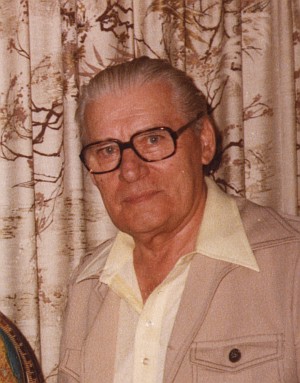 |
Karl King was a very humble man. He loved
people and people loved him. I don't think I ever heard him
say a word against anyone in all the time I knew him, which was from the
time he came to Fort Dodge when I was only a boy - about 16 years old and
just starting to play in the band. He was always very easy
to talk to talk to. In fact, I could go and talk to him about
things that I probably couldn't get my own dad to sit down and talk about.
And he'd sit there and give his time and was very gracious about it.
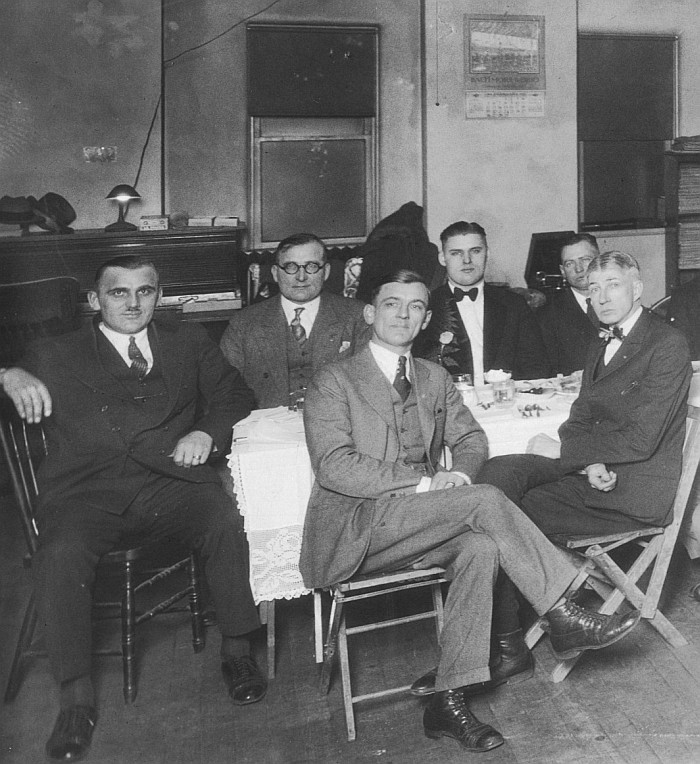
Tim Pray and other
band members are pictured in 1928 dining in their humble rehearsal hall
above a harness shop in Fort Dodge. At left is Walt Engelbart, the
band's manager. To the right of Walt on the far side of the table
are Lou Pray (Tim's dad) and Tim Pray. In the foreground at
right is Cy Tremain. The
entire
photo shows all band members and Karl King.
I never heard him deride anyone or say anything against
them at all. I heard, sometimes, people say something to him that
I knew hurt him, but it never seemed to bother him at all, it just went
off him like water off a duck's back. In fact, he had
a way of putting people in their place when they tried to deride him and
it kind of makes them feel like they should sit down and keep still, you
know. I remember one time we had a young fellow come on the
band who had taken some courses at a musical conservatory, and according
to his opinion, he was just about the last word as a band musician.
He was playing with us one summer, and we played a march. I've
forgotten which one it was, but he made the remark to King. He said,
You know, I don't think too much that tune musically. And King
says, Well, don't let it bother you, young fella. I only got ten
dollars for it when I wrote it and sold it!
Another time, we were playing the state fair.
Something had come up that there was a V.I.P. in town. They
needed a band over on the plaza for a greeting for this person, and it
was up to us to leave the grandstand and go over there. So
Karl was hurrying everyone up to get packed up and get over there to take
care of this job. We had a young fellow on the band who was
inclined to be somewhat of a comedian. And he said, Teacher,
I'll never make it! Karl says, Well, I'll tell you,
you'll never be missed!
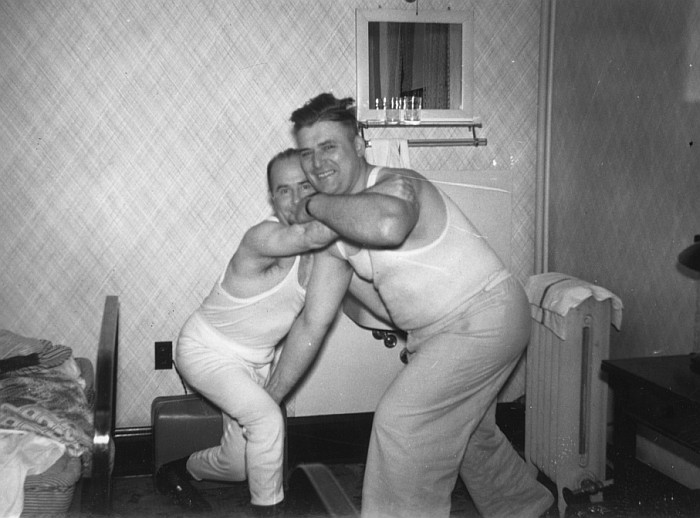
Ralph
Pee
Wee Peer and Tim Pray are shown clowning around in their room at
the Tangney Hotel in 1946 during their stay at the Clay County Fair in
Spencer, Iowa.
In the twenty's and thirties and some in the forties,
the band used to play a lot of fair jobs in the summer and fall, late summer
and fall. Sometimes we would be out for eight or nine weeks playing
fairs in a different part of the state, and some up in Minnesota, and some
in Missouri. It got to be such a problem, particularly in the
smaller towns, to house a band of 25 to 30 people, that they purchased
some tents from war surplus from World War I. We had what had been
an army hospital tent that we used for a dormitory tent and we had a couple
of fly-type tents that we used for a dining area and a kitchen area.
Of course, we carried our own cook, and we had a regular tent city of our
own. So we would set up on a campground or in a park somewhere near
the fairgrounds and we had our own situation where we didn't have to rely
on eating at restaurants and trying to put the band up in a hotel somewhere.
In those days we didn't have any electric lights in the
camp and we relied on gasoline lanterns. I recall one time that we
were in Audubon and we were going to go to Sioux City the next week.
It happened that the secretary of the Sioux City Fair's name was Floyd,
and his knickname was Attaboy. Anyway, one night in the middle
of the night I happened to be sleeping right next to Karl on a cot.
He woke me up. He said, Do you suppose you could light one of
those lanterns for me? I said, Yeah, what's the matter?
Don't you feel well? Oh yeah, he said. I feel
all right, but I've got a tune running through my head and I'd like to
write it down.
So I lit one of the lanterns and went on into the dining
area. He sat at a table there and got out his manuscript paper and
his pen. He wrote music just like you or I would write a letter.
There was no hunt and peck like they show in a movie of a man sitting at
a piano composing a tune. He just sat there and wrote out a part.
It might be a clarinet part or a trumpet part or any kind of a part.
He'd just write it out. So he was out there about thirty minutes
and wrote this down. He said, Well, that'll last 'til morning,
now.
So we went back to bed. The next morning after breakfast
he got out his manuscript paper. He sat there and arranged it, and
in the afternoon we played it. I don't remember how long it was after
that until the thing was finally was published, but it was published.
He named the tune Atta Boy after the secretary of the Sioux City
Fair.
Hear Tim Pray tell about a
few more of Karl King's compositions.
(mp3 format)
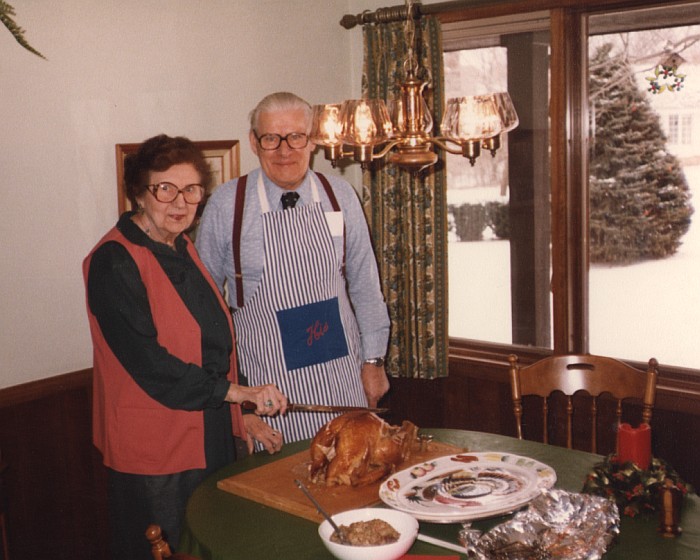
Ruth King celebrated Christmas of 1980
with Tim Pray.
Hear Tim Pray tell a story about Karl King's
massed
band experience
and of meeting
Herbert Clarke during the ABA Convention in Fort Dodge.
(mp3 format)
Another time we were playing a fair down in Atlantic,
Iowa. They had a couple of hometown acts and one of them was a real
ham. It was two fellows under a canvas - was supposed to be a horse
- and, of course, their trainer. This trainer called this horse Boliver.
It was so terrible, that it was really funny, you know. We got rained
out at night and couldn't play the show on one night. So we went
downtown and were in the cafe; it was chilly and raining. We ...
had a cup of coffee and sat around talking for a while. It finally
quit raining so we got out into the street and somebody suggested that
we put on the Boliver act. A fellow by the name of Ed Wosky, was
a baritone player, and I got King's raincoat. We got under the raincoat
and we were the horse and King was the trainer. So we put the Bolivar
act on the streetcorner down there.
The next morning Karl sat down and wrote a march and named
it Bolivar. That afternoon they played that, and it was a
real fine march with a real tough baritone part in it.
This man Wosky was feal fine baritone player. He
used to kid some of the younger players on the band. He had an old
Cerveny baritone, looked like it had been through the war. It was all battered
up. These young fellows would come on the band with a real shiny
instrument. They would be working on it, wiping it off with a cloth.
One of them said one day, Mr. Woskey, what do you use to shine your
horn with? Ed says, Oh, I use Lewis Lye and Ludack.
That always does a real good job and preserves the tone!
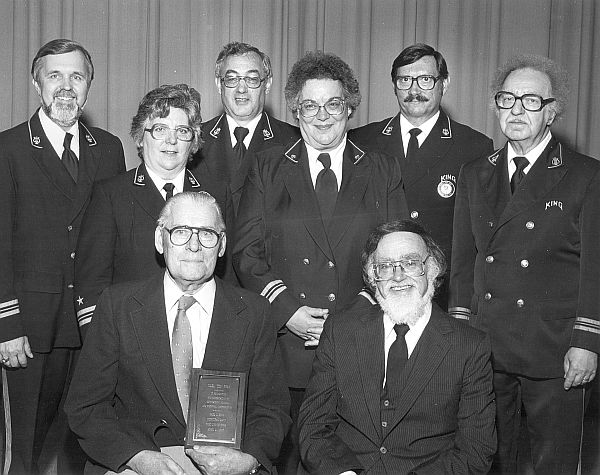
Karl King Band board members are
pictured presenting a Service Award plaque to Carl Tim Pray.
Pictured in front are Carl Pray and Reggie Schive, conductor. In
the back from left are Ross Leeper, Ardella Hein, Keith Altemeier, Phyllis
Phillips, Duane Olson, and Arnold Bode.
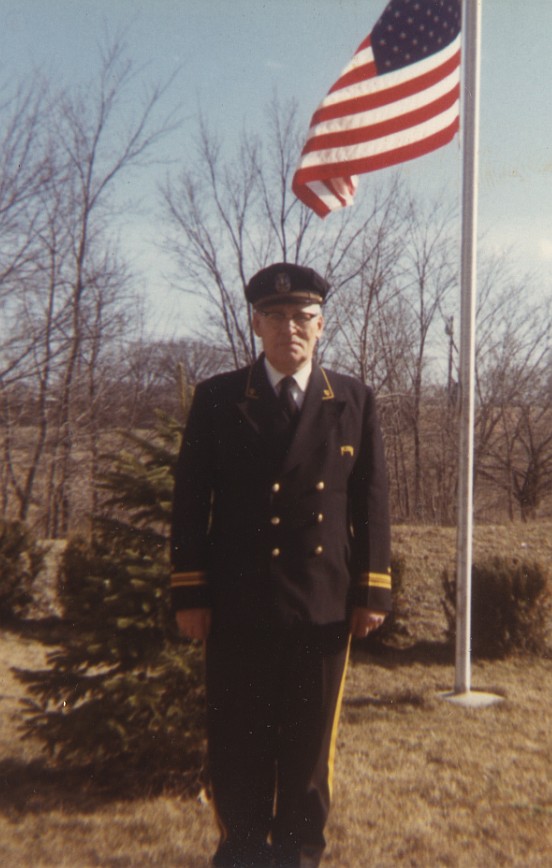
This photo of Tim Pray in his King Band
uniform was taken in April of 1971.
Hear Tim Pray tell how circus performers
cherished Karl King's expertise.
(mp3 format)
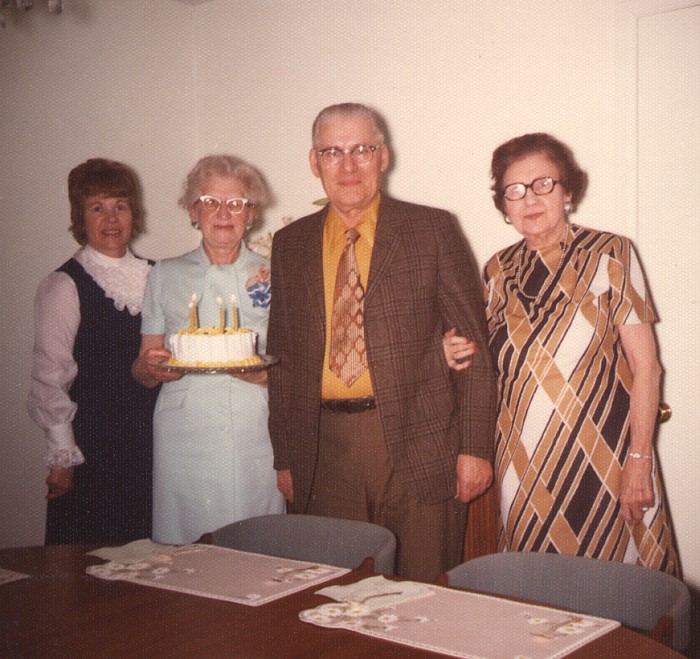
Birthday celebration, Velma and Tim Pray
with Ruth King
Hear Tim Pray tell a story about how Karl
King helped out a local fair act.
(mp3 format)
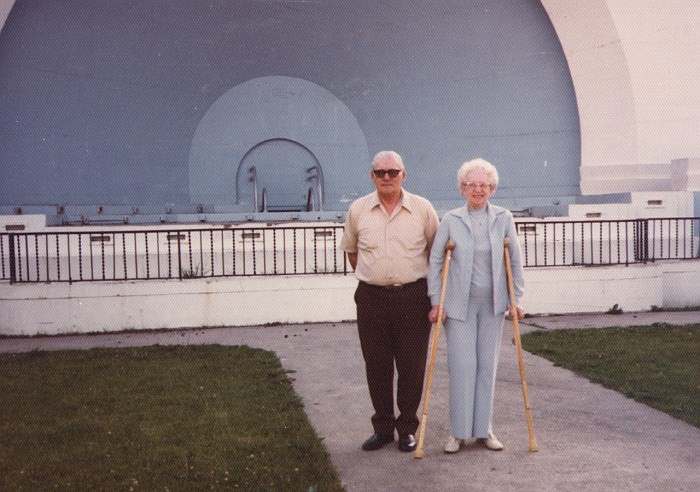
Tim and Velma Pray
back







